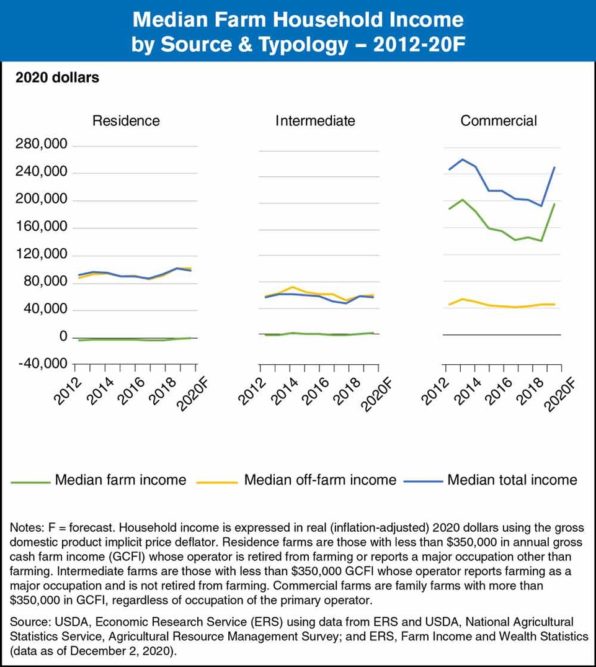In 2020, USDA’s Economic Research Service (ERS) expects the inflation-adjusted median household income for the principal operators of commercial and intermediate U.S. farms to increase by an estimated 29.6% and 4.9%, respectively. By comparison, household income for principal operators of residence farms is estimated to remain relatively unchanged.
Many farm households rely on a combination of on-farm and off-farm income sources. Generally, residence farms rely most on off-farm income sources. ERS forecasts the median off-farm income for residence, intermediate, and commercial farm households to decline in 2020, with residence farms expected to have the largest percentage decline at 3.4%. This decline is due to estimated lost employment and wage income as a result of the coronavirus pandemic, which is partially offset by estimated Economic Impact Payments distributed to most U.S. households as part of the pandemic financial relief efforts.
Median farm income for intermediate farm households is forecast to increase by 165%, from $662 in 2019 to $1,756 in 2020.By comparison, median farm income for commercial farm households is expected to increase by 39%, from $140,729 in 2019 to $194,982 in 2020. Median farm income for residence farms households is estimated to increase too, from –$810 in 2019 to –$160 in 2020. The increase in median farm income is due to pandemic financial relief payments from Federal programs, such as the Paycheck Protection Program (PPP) and the Coronavirus Food Assistance Programs (CFAP) 1 and 2. The increases in median farm incomes were partially offset by the decline in median off-farm income. Because households operating residence farms rely most on off-farm income sources and are estimated to receive smaller amounts of government programs, their median total household income is forecast to decline slightly overall.
This chart uses data from ERS’s Agricultural Resource Management Survey webtool and the Farm Income and Wealth Statistics data product, released December 2020.




![[Technology Corner] What are the Top 5 Applications in Autonomy Right Now?](https://www.agequipmentintelligence.com/ext/resources/2024/11/08/What-are-the-Top-5-Applications-in-Autonomy-Right-Now-.png?height=290&t=1731094940&width=400)
Post a comment
Report Abusive Comment